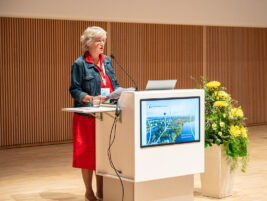Welcome to our Spring 2025 issue of Perspectives,
Our first paper in this issue, which is focused on Professional Development, is an excellent piece by Harleen Hutchinson, which describes the JUSTICE Framework in Reflective Supervision and its role in empowering supervisors and leaders globally. Dr Hutchinson argues that this framework equips leaders to address systemic barriers and engage in authentic, multicultural practice. With the aid of a case study, she shows how it can be used across cultural contexts to advance equitable reflective supervision, encouraging infant mental health organizations to make a sustained commitment to social justice in leadership practices.
In Community Voices Barbara von Kalckreuth (Germany) and Jenifer Joy Madden (United States) invite you to join the Global Alliance for Inspiring Non-tech Infant Nurturing and Growth (GAINING), which is underpinned by increasing concern about the impact of extensive screen viewing in very young children (0-3yrs) on key aspects of their cognitive, physical and social-emotional development. They describe one of their strategies – one-page Alerts for government agencies, healthcare professionals, and parents – aimed at supporting infant development and reduced screen viewing in the early years.
We also have four excellent clinical papers. In the first paper Markus Wilken (Germany), Mary Coughlin (United States), and Susanne Hommel (Germany) describe Pediatric Medical Traumatic Stress (PMTS), examining the specific stressor that can occur in the NICU setting, and the evidence about its impact on both infant and caregiver. They argue that recognition of this stress is necessary to prevent problems through the use of Trauma-Informed Developmental Care (TIDC) and Emotional Revival Therapy (ERT). The authors describe how these early interventions in NICU can help prevent later regulatory and attachment disorders in infants as well as perinatal psychiatric disorders in parents.
Our second paper, is an extract from a chapter by Joy and Howard Osofsky that was published in the latest edition of the Handbook of Infant Mental Health. It focuses here on the significant secondary impact of the pandemic that occurred in large part due to the way in which the restrictions that were put in place undermined the core developmental need of young children for relationships. This excerpt examines the way in which such relationships are a central part of their recovery in the post pandemic period.
The third paper from a US team led by Kelly Elliott, describes WeRead, which is an early literacy and language development psychoeducation program available in English and Spanish (Nosotros Leemos), and is designed for caregivers and their children ages 0-3. This article explores the potential for expanding initiatives of this sort and considers how similar models can be applied to other early childhood and parenting support programs.
Our final clinical paper written by a team from Australia led by Sophia Harris, describes ForWhen, which is a national perinatal and infant mental health care navigation service. This paper illustrates the use of care navigation to connect Australian families with perinatal and infant mental health support, through four clinical case studies.
In Opinion Pieces, Susanne Hommel, Barbara von Kalckreuth, and Margret Ziegler (Germany) describe the newly published German Diagnostic Classification and Intervention in Infant Mental Health Guidelines. Their commentary describes the major changes to the guidelines, their views about the ongoing limitations of the guidelines, and some thoughts about what future revisions are needed.
Our book review, written by Salisha Maharaj (South Africa), examines The Politics of Potential: Global Health and Gendered Futures in South Africa by Michelle Pentecost.
Finally, and in keeping with the need to ensure that equity, diversity and inclusion issues continue to be a priority everywhere, the next edition of Perspectives is a Special Issue focused on Decolonising Infant Mental Health Research, Practice and Intervention. This involves the rethinking and reshaping of the field by identifying and addressing biases in existing theories, research, and interventions. This includes questioning the dominance of Western perspectives and ensuring that non-Western knowledge systems are valued and integrated into our existing knowledge base. We would welcome papers that address systemic injustices across a range of areas (e.g. cultural context; community-based approaches, ethics etc) and across all our submission categories: clinical, research, professional development, opinion pieces, and community voices.
Your sincerely,
The WAIMH Perspectives in Infant Mental Health editorial team
Jane Barlow, Editor-in-Chief, United Kingdom
Salisha Maharaj, Assistant Editor, South Africa
Maree Foley, Associate Editor, Switzerland
Jody Todd Manly, Associate Editor, United States
Azhar Abu Ali, Associate Editor, United Arab Emirates
Patricia O’Rourke, Associate Editor, Australia
Joy Osofsky, Associate Editor, United States
Harleen Hutchinson, Associate Editor, United States
Michelle du Plessis, Associate Editor, South Africa
Nicki Dawson, Associate Editor, South Africa
Lauren Keegan, Editor, Australia
Neea Aalto, Production Editor, Finland
Perspectives in Infant Mental Health Vol. 33 No. 1 | Spring 2025
Authors
Jane Barlow (United Kingdom), Editor-in-Chief








